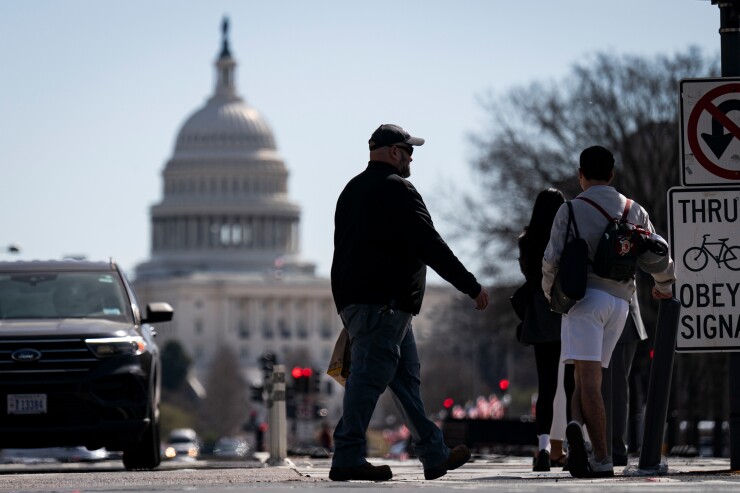A pair of Senate bills would coordinate Pell Grants with the American Opportunity Tax Credit, and provide a tax deduction for overtime wages.
Senate Finance Committee members Chuck Grassley, R-Iowa, and Sheldon Whitehouse, D-Rhode Island, introduced bipartisan legislation Tuesday that would coordinate Pell Grants with the AOTC, and fully exclude Pell Grants from taxable income, while Sen. Tommy Tuberville, R-Alabama, and Roger Marshall, R-Kansas, separately introduced a bill related to President Trump's campaign promise on exempting overtime pay from taxes.
The first bill, known as the
"The Pell Grant program has revolutionized American higher education by helping millions of qualifying students afford the cost of college," Grassley said in a statement Tuesday. "Our bipartisan Tax-Free Pell Grant Act would cut through confusing tax rules and allow Iowans to take full advantage of this financial student aid program."
The Pell Grant program helps millions of young people cover college costs, including tuition, living expenses and other fees. The AOTC, which was made permanent in 2015 with bipartisan support, provides students up to $2,500 for tuition and course materials, assisting millions with the cost of college. However, the lack of coordination between the two programs keeps students from maximizing the programs' benefits.
The issue mainly affects students at lower-cost schools like community colleges. While Pell Grants used for tuition and fees are tax-free, any portion used to cover other education costs, like living expenses, is taxed. Students are currently required to subtract their Pell Grant from the amount of expenses for which they claim the AOTC. To maximize their AOTC, students can use part of their Pell Grant to cover living expenses even though that portion is taxed. But calculating the optimal amount of the Pell Grant to include in taxable income is complicated for those without access to sophisticated tax advice, so many students leave benefits on the table or forgo claiming the AOTC altogether.
"Pell Grants — one of Senator Pell's greatest legacies — have helped make college more affordable for generations of Rhode Islanders," Whitehouse said in a statement. "Our bipartisan legislation will streamline federal student aid programs and ensure students get the maximum possible benefit to achieve their higher education goals."
Additional cosponsors include Sen. Ron Wyden, D-Oregon, and Thom Tillis, R-North Carolina. The bill's introduction comes amid proposals by the Trump administration for a
"The American Association of Community Colleges, which represents the nation's 1,024 community colleges and their more than 10 million students, enthusiastically endorses the Tax-Free Pell Grant Act," said Dr. Walter G. Bumphus, president and CEO of the American Association of Community Colleges, in a statement. "This critical legislation will help to ensure that the Pell Grant program has maximum impact on student success. It simplifies the tax code, while making it easier for low-income community college students to qualify for the American Opportunity Tax Credit. The legislation is of particular benefit to students attending low-tuition, locally-focused institutions that help individuals learn the skills needed to earn family sustaining wages — in other words, America's community colleges. We urge the enactment of this critical legislation."
Overtime pay
Separately, two Republican senators, Tuberville and Marshall, introduced the
"President Trump campaigned and won on a promise to cut taxes for millions of Americans working overtime — and we are delivering on that promise," Tuberville said in a statement. "Thousands of Alabamians put in way more than 40 hours a week in order to save for retirement, put their kids through college, and keep the trains running. They should not be punished with higher taxes for working longer hours. Alabama was the first state to pass overtime tax exemptions, and I am hopeful that the federal government will follow suit. I'm proud to join Senators Marshall, Ricketts, and Justice in helping deliver on this critical piece of President Trump's agenda, which will put American workers first."
The bill includes a phase-out on eligibility based on income. The deduction would begin to phase out when income reaches $100,000 for individuals or $200,000 for married couples, and would be reduced by $50 for every $1,000 in income above the threshold, similar to the Child Tax Credit. The bill would define overtime to include a wide range of workers such as law enforcement officers, nurses, trade workers, factory employees and other eligible professions, and require employers to report overtime earnings to ensure transparency and accuracy in claiming the deduction.
"President Trump promised relief for millions of hardworking Americans, and we're proud to help deliver on that with the Overtime Wages Tax Relief Act," Marshall said in a statement. "Our legislation ensures Kansans keep more of their hard-earned wages and codifies a key pillar of President Trump's pro-worker agenda as we work to pass our 'One Big Beautiful Bill.' It's time to put American workers first again, and I'm proud to work with Senators Tuberville, Ricketts, and Justice to ensure we do just that."
Two other Republicans joined Tuberville and Marshall in introducing the legislation: Sen. Jim Justice, R-West Virginia, and Pete Ricketts, R-Nebraska.






